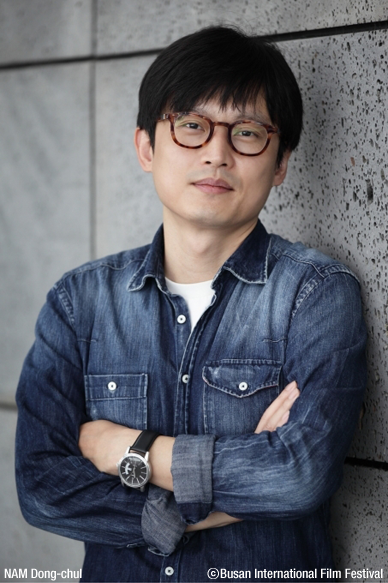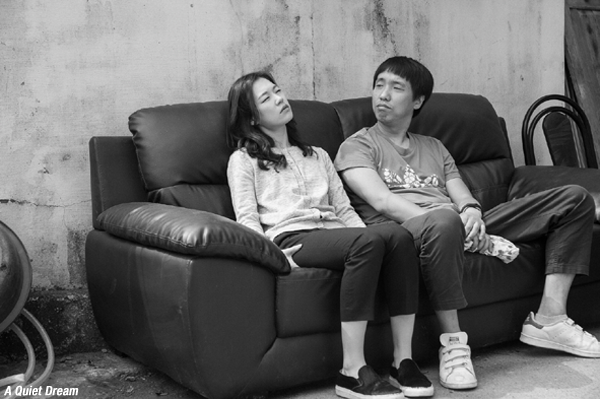hankyoreh
Links to other country sites 다른 나라 사이트 링크
[Cine interview] “I realized how important every single film is to hold a film festival”

The 21st edition of Busan International Film Festival (BIFF) came back in October this year, and Nam Dong-chul, the Korean Cinema programmer, shares with us his thoughts about BIFF. This interview was conducted on October 2nd, a few days before the opening of the festival.
The 21st BIFF is finally kicking off. How do you feel now about the festival?I realized that every single film is precious and how important it is to hold a film festival. There are so many people who love BIFF. I am determined to do my best to return their affection.
Zhang Lu’s A Quiet Dream will open this year’s edition. What was the reason behind this choice?A Quiet Dream is like the starting point of a second period in Zhang Lu’s works. While the films in his first period, like Tang Poetry (2005), Grain In Ear (2006) and Dooman River (2011), were rather gloomy and pessimistic, his recent projects are brighter and more optimistic. I think that A Quiet Dream is representative of such current. It is great to have his film for the opening ceremony after having seen him receive the New Currents Award for Grain In Ear at BIFF.
There are many new local films in Vision section. Do you recognize any tendency?It is not easy to compare diverse movies, however if I had to mention only one, it would be that there are many films with formal experimentations. For example, Picture of Hell is made of only long shots, both Jane and Jamsil break down the boundaries between reality and imagination, while The Noises is an unusual comedy and Autumn, Autumn has two stories shown in parallel. Also, there are a lot of coming-of-age films, like In Between Seasons, Baby Beside Me and Yongsoon.

Two films from the New Currents section and eleven films from the Vision section are noteworthy. In addition, both In Between Seasons and Merry Christmas Mr. Mo are remarkable when they come to create emotional sympathy. In addition, Shin Dong-il’s Come, Together keenly shows an aspect of our society from a different angle.
As a programmer, what do you think of the Korean commercial film industry?
The rich get richer while the poor get poorer. On top of that, all the theaters throughout the country tend to be always dominated by only one of the Korean films released at the same time. It has become harder and harder to produce medium-sized films, and because of that the range of genres and subject matters get unfortunately limited.
Feature indie films are struggling more and more at the box office. What should be done first to overcome this situation, and what is BIFF’s role in the process?
The gap between commercial films and indie films is too wide. The scopes of distribution and promotion of commercial films are many times larger than those of indie films. A new system is needed so that other ways of distribution would be accessible for good films. We could come with a new way of distribution between film festivals and regular releases. In addition to discover and introduce independent films, BIFF also has support funds like the one intended for post-production. In the future, we will have to think of other ways to help their promotion and distribution.

Sixteen projects were selected for the Korean Short Film Competition section this year, six more than last year. There were a lot of wonderful and well-made works. The line between feature length and short indie film is often vague these days. It is because the length of short films tends to be longer and stories sometimes require a specific running time that is longer than a short movie but shorter than a feature one.
The special guest of the Korean Cinema Retrospective is director Lee Doo-yong. What do you value the most in his works?Some of his films showcase the best standards of their time. He is good at developing his plots powerfully through bold editing. The eight movies of the retrospective program at this BIFF all show this characteristic.
By Kim Hyung-seok. Cine21 reporter
- See more at: http://www.koreanfilm.or.kr/jsp/news/interview.jsp?pageIndex=1&blbdComCd=601019&seq=236&mode=INTERVIEW_VIEW&returnUrl=&searchKeyword=
These contents were reproduced with the permission of Kofic, which holds all copyright.
Editorial・opinion
![[Editorial] Intensifying US-China rivalry means Seoul must address uncertainty with Beijing sooner than later [Editorial] Intensifying US-China rivalry means Seoul must address uncertainty with Beijing sooner than later](https://flexible.img.hani.co.kr/flexible/normal/500/300/imgdb/original/2024/0517/8117159322045222.jpg) [Editorial] Intensifying US-China rivalry means Seoul must address uncertainty with Beijing sooner than later
[Editorial] Intensifying US-China rivalry means Seoul must address uncertainty with Beijing sooner than later![[Column] When ‘fairness’ means hate and violence [Column] When ‘fairness’ means hate and violence](https://flexible.img.hani.co.kr/flexible/normal/500/300/imgdb/original/2024/0516/7417158465908824.jpg) [Column] When ‘fairness’ means hate and violence
[Column] When ‘fairness’ means hate and violence- [Editorial] Yoon must stop abusing authority to shield himself from investigation
- [Column] US troop withdrawal from Korea could be the Acheson Line all over
- [Column] How to win back readers who’ve turned to YouTube for news
- [Column] Welcome to the president’s pity party
- [Editorial] Korea must respond firmly to Japan’s attempt to usurp Line
- [Editorial] Transfers of prosecutors investigating Korea’s first lady send chilling message
- [Column] Will Seoul’s ties with Moscow really recover on their own?
- [Column] Samsung’s ‘lost decade’ and Lee Jae-yong’s mismatched chopsticks
Most viewed articles
- 1For new generation of Chinese artists, discontent is disobedience
- 2[Column] US troop withdrawal from Korea could be the Acheson Line all over
- 3[Editorial] Transfers of prosecutors investigating Korea’s first lady send chilling message
- 4[Exclusive] Unearthed memo suggests Gwangju Uprising missing may have been cremated
- 5[Editorial] Intensifying US-China rivalry means Seoul must address uncertainty with Beijing sooner t
- 6Xi, Putin ‘oppose acts of military intimidation’ against N. Korea by US in joint statement
- 7China calls US tariffs ‘madness,’ warns of full-on trade conflict
- 8Could Korea’s Naver lose control of Line to Japan?
- 9China, Russia put foot down on US moves in Asia, ratchet up solidarity with N. Korea
- 10For Korea’s Justice Ministry, no place is sacred from immigration raids